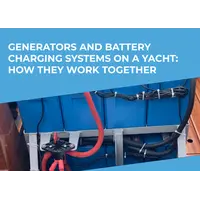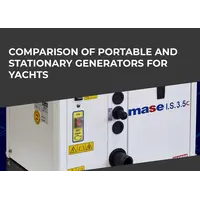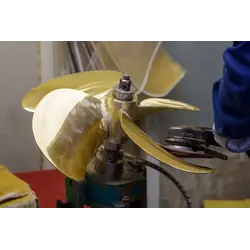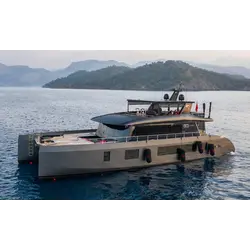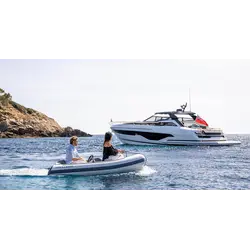Now we will tell you about the reasons why the air conditioner on your yacht or boat has stopped cooling, and what you can do about it. We would like to warn you right away that we are not responsible for your actions, since everyone has a different level of knowledge and experience in handling the electrical equipment of a yacht. The article is for informational purposes only and does not call for action.
If you have any doubts about your experience in repairing air conditioning or working with yacht electrics , it is better not to do the repairs yourself, but to contact professionals at the service center. But every skipper should know about the cause of the most common malfunctions.
Let's start with the fact that there are many types of yacht air conditioners - from simple devices for one or two rooms to branched split systems and chillers that are mounted on large boats. Since superyachts usually have an electrician on board, we will focus our attention in this article on simpler air conditioning systems.
How Does an Air Conditioner Work?
Retrofitting a vessel with a stationary air conditioning system implies the presence of an autonomous power supply source on board - a generator and/or battery pack. Previously, air conditioning on board was considered a luxury and required a powerful and power-hungry generator to operate it, but these days the situation has changed thanks to significant advances in the field of refrigeration compressors, electric motors and heat exchangers, solar batteries, etc.
Installing the system will require intervention in the structural elements of the boat: it is necessary to make a hole in the bottom of the hull to draw in the water necessary to remove heat from the condenser, and another scupper will be needed to drain this water overboard. Next, you will need to place all the necessary equipment and lay pipelines and air ducts. Nevertheless, the presence of a stationary air conditioning system on a small boat has long been a standard that meets the modern standard of living.
The choice of system from the huge number of offers on the market depends only on the requirements of the boat owner and his budget. Please note that the topRik marketplace offers a large selection of marine air conditioning accessories, the correct choice of which guarantees the installation of the ideal air conditioning system for a yacht of any size and configuration.
In terms of its basic set of elements, an air conditioner is a complete analogy of a refrigerator: a refrigerant circulating in a closed circuit (evaporator - condenser), a compressor and electronics that control the entire process.
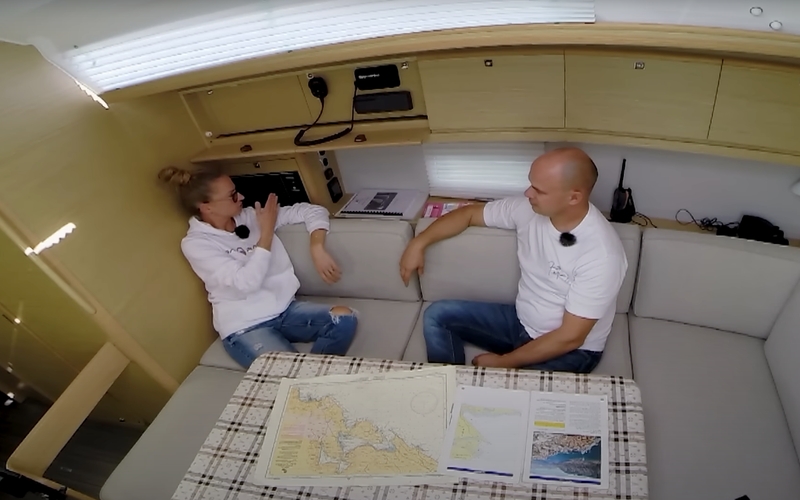
At the beginning of the cycle, the liquid refrigerant enters the evaporator (it looks like a car radiator), where it expands sharply and boils. The resulting gas (low pressure) has a significantly lower temperature - after all, part of the heat content of the refrigerant was spent on its evaporation. Cold refrigerant vapor passes through the evaporator, blown by warm, moist air from the cabin. It cools, giving off heat to the refrigerant vapor, excess moisture condenses on the evaporator and flows into the drain pan. And the cooled and dried air returns to the cabin.
The refrigerant vapor heated in the evaporator is compressed by the compressor and supplied to the condenser, where it is converted into liquid refrigerant: excess heat is carried away either by atmospheric air (due to the fan) or by sea water (due to the pump). Therefore, air conditioners are divided into two types: air-cooled or water-cooled.
It is clear: the higher the temperature and humidity of the air, the more energy must be spent on cooling it and condensing “excess” water, and the higher the load on the air conditioner. But simply drying the air without noticeably cooling it already gives a feeling of comfort. In addition, drier air prevents the formation of fungi and mold on the boat and extends the life of wooden parts.
What to Consider When Choosing Air Conditioning System
Numerous breakdowns of the air conditioning system on a yacht can be avoided even before its installation. If, when choosing, the yacht owner or a specialist hired by him takes into account all the features and needs of the vessel and selects the equipment correctly, you can avoid many problems associated with malfunctions due to the wrong choice of system or errors during its installation.
Today the market offers a wide selection of air conditioning systems, specially designed for use on yachts and boats of any size and architectural and design features. In addition, a number of companies offer the development and manufacture of individual designs of air conditioners and systems for a specific vessel project.
In this article we will look at systems and equipment for boats and yachts up to 15 m (45 ft) in length. More complex systems should be handled by professionals - from calculations and equipment selection to installation.
"Small systems" are relatively inexpensive and fairly easy to install with simple tools and a little experience. When choosing the system that is most suitable for your boat, you will have to consider many factors that influence the correct choice. The factors listed below are not all that need to be taken into account, but they are the most important.
1. First of all, let's decide whether we need, in addition to air cooling, to also have heating. This can significantly affect the overall project cost. Next, we calculate the required cooling capacity (and, if necessary, heating capacity) of the system.
2. If the boat is small, up to 10-12 m, you can get by with one air conditioner, which will serve several rooms. If the boat is larger, it may be necessary to divide it into zones that will be served by several air conditioners - each for its own habitable compartment.
3. Next, we determine the type of system and location of the air conditioner. The unit must physically fit into the available free space for its installation.
The choice of air conditioners for boats and yachts in the topRik marketplace is large; carefully study all the offers in terms of their dimensions and possible layout solutions, or contact our experts for a free consultation.
Ideally, for a boat or yacht up to 12 m in length, the air conditioner should be located under the sofa, upholstered furniture in the wardroom, under the V-shaped berth in the bow cabin, or somewhere in the locker (furniture). Under no circumstances should the air conditioner be placed in a compartment where explosive vapors or gases may be released.
As for monoblock air conditioners, the air conditioner must not be allowed to capture and pump exhaust gases into the living compartment. In addition to the location of the air conditioner, you will need to determine the location of the seawater intake and discharge points, as well as satisfy two more important requirements: that the seawater pump and strainer be located below the waterline, and that the overboard water discharge fitting be no higher than 20-25 cm above waterline.
4. Next, you need to find out the following important points for correct installation of the system:
can you place a thermally insulated air duct and a flow separator (shaped element) in the location of your choice to supply air to several rooms;
- can the air outlet grilles be located as high as possible in the cabin - in the area of the ceiling - without unnecessary turns of the air duct, taking into account that each bend of the air duct by 90° due to increased aerodynamic resistance reduces the efficiency of the system by 14%;
- is it possible to install a recirculation air grille of the required size next to the evaporator (this condition applies only to autonomous air conditioners);
- will condensate be able to flow freely into the hold or into a separate receiving tank with a pump-out pump, or into a special pan, etc.
5. Finally, we determine the energy source from which the system will operate.
Checking the Most Obvious Reasons
The most common reasons that the air conditioner has stopped removing heat and moisture from the room (cabin, saloon, technical compartment) are the following:
- incorrect installation;
- refrigerant leak and deficiency;
- excess freon in the system;
- contamination of indoor unit filters;
- contamination of the heat exchanger of the external unit;
- unit fans are broken or dirty;
- temperature sensor failure;
- compressor breakdown;
- the fuse in the external or internal unit has burned out;
- electrical problems on the yacht.
Some of these faults must be fixed by a specialist (the last three on the list), some can be fixed yourself if you have practical skill. A significant part of the malfunctions can be avoided by correctly calculating and installing air conditioning system , as we described above.
Common Problems and Their Solutions
Before finding out the cause of the breakdown, make sure that the breakdown exists. It should be remembered that you cannot expect a rapid change in the microclimate if you arrive on the ship in the midst of the midday heat and turn on the system. A yacht contains tons of furniture, equipment and other heat-accumulating materials, so it will take about six hours until the system cools all this mass and returns to normal operating mode. But if even after the “control” time the air conditioner does not cool, we begin to identify and eliminate the causes of the malfunction of air conditioning system.
The Air Conditioner Is Installed and Connected Incorrectly
The air conditioner most often refuses to cool the air due to incorrect installation. In a situation where the air conditioner is turned on and does not cool the air, you should first check the correct connection of all cables connecting the indoor and outdoor units , as well as pipelines.
If any violations are detected during installation, you should call specialists without taking any action on the air conditioning system yourself.
We recommend contacting certified service centers that provide air conditioner repairs, cleaning, refueling, and other marine air maintenance services. conditioning system. In such authorized centers you are guaranteed to be provided with original spare parts and provided with proprietary repair technologies.
Freon Is Contained Either on Excessive or Insufficient Quantities
The reasons for the lack of refrigerant (freon) are small leaks that occur constantly, as well as rare refills of the device. Climate control equipment should be “fed” at least once a year - this will ensure normal cooling of the air in the room.
Too frequent replenishment of freon reserves is usually the reason for the excess refrigerant. The consequences are the same as in the case of freon shortage.
The refrigerant level should be replenished or excess refrigerant removed to normal levels.
Filter Contamination
Due to contamination of the filters located in the indoor unit, not only the main function of the device may fail, but many other malfunctions may also occur. You just need to clean the filters in a timely manner. You can even replace/clean air filters yourself.
The filters are located under the cover of the internal unit of the device. Having opened it, you need to take out the filter elements and wash them with water and detergent. Then leave to dry and install back.
The Heat Exchanger of The External Unit Is Dirty
Over time, the surface of the heat exchanger becomes covered with dust, dirt, poplar fluff and other contaminants. All this forms something like a film that prevents the normal functioning of the equipment. How to deal with trouble? Clean the heat exchanger with a steam cleaner or high-pressure washer.
The Indoor Fan Is Dirty
To fix the problem, you will have to disassemble the split system and remove the contaminated element for cleaning. This operation must be performed by specialists.
The Fan of The External and/or Internal Unit Is Broken
Air conditioner parts may fail. Fans break down due to the fact that the control board of the starting capacitor or electric motor fails. Service center specialists will help diagnose the “sick” air conditioner and replace the broken element.
Breakdowns That Cannot Be Repaired by Yourself
Next, it is proposed to consider the causes of fails that occur infrequently, but which in most cases should be eliminated by a professional repairman:
- temperature sensor failure;
- compressor breakdown;
- fuse failure.
Repair/replacement of a compressor if it breaks down is carried out only with the assistance of a specialist.
If a fuse in the external or internal unit has burned out, as a rule, it is a consequence of improper operation of the air conditioner.
These cases require the involvement of a specialist who will find out the cause and fix the problem by replacing faulty sensors, fuses or the compressor, if the latter cannot be repaired.
Above, we gave a warning that we are not responsible for your actions, and now we recommend that if you have the slightest doubt, turn to professionals, since some sailors tend to exaggerate their knowledge and experience. In the case of electrical equipment, it is better to treat your abilities with healthy skepticism, so as not to suffer yourself and save money, which, with unprofessional intervention, may be needed for more serious repairs of an air conditioning system, or even the yacht itself.



